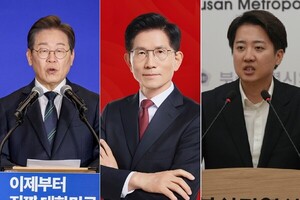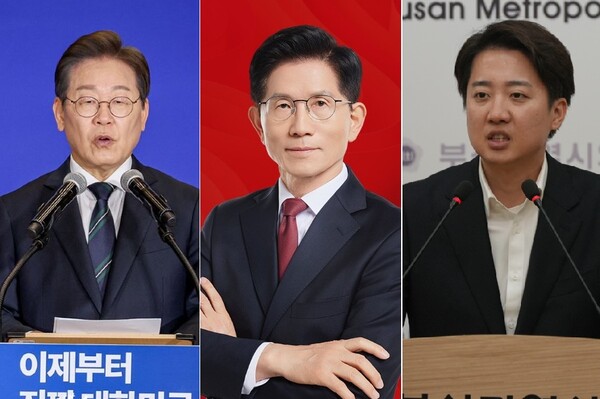Presidential candidates: Who will rewrite Korea’s healthcare playbook? < Policy < Article

As Korea’s 21st presidential election campaign officially kicks off, healthcare reform has emerged as a central policy issue, with leading candidates pledging to overhaul the system through more inclusive and sustainable approaches.
While avoiding direct reference to the controversial medical school quota expansion sought under the former Yoon Suk Yeol administration, all major candidates emphasized public and expert participation in policy development — an apparent attempt to distance themselves from past unilateral reforms.

Lee Jae-myung: Public-centered reform and expansion of essential care
The Democratic Party of Korea candidate Lee Jae-myung has positioned healthcare reform as a core element of his campaign platform, ranking it fifth among his ten main policy pledges.
A former governor of Gyeonggi Province, Lee also ran in the 2022 presidential election and most recently served as the Democratic Party’s leader until declaring his candidacy.
Lee promises to establish a “Public Participatory Healthcare Reform Committee,” aimed at ensuring that citizens, physicians, and other stakeholders play a direct role in shaping reforms.
His healthcare vision focuses on strengthening public and regional medical infrastructure by establishing new regional medical schools and a public medical officer academy, thereby increasing the pool of essential and community-based physicians.
Lee also pledges to expand the role of national university hospitals as regional hubs and to implement a 24-hour specialist emergency response system to resolve overcrowding and patient transfers in emergency rooms.
Additionally, Lee vows to improve compensation for essential medical services, reinforce state responsibility for medical accidents, and institutionalize telemedicine.
His health insurance policy includes enhancing financial stability through national subsidies and revising the reimbursement system to reflect service value more rationally.
He further aims to reduce out-of-pocket costs by expanding coverage tailored to specific demographics and diseases, and to strengthen national support for rare and pediatric diseases, including childhood obesity and diabetes.
Kim Moon-soo: Overhauling Yoon’s reforms and restoring trust in the system
People Power Party candidate Kim Moon-soo is taking a more radical stance, pledging to completely reexamine and rebuild the medical system dismantled under the previous government. Kim, who served as Minister of Employment and Labor under the Yoon administration, has a long political history including time as a National Assembly member and governor of Gyeonggi Province.
He proposes launching a Presidential Committee on the Future of Healthcare, which would include medical students and frontline experts in the policy-making process, thereby amplifying the voices of future and current medical professionals.
Kim has not explicitly endorsed or rejected the expansion of medical school quotas but has criticized previous reforms for their lack of scientific basis and failure to consider systemic issues like hospital capacity and referral networks.
In past public remarks, Kim stated he would consider government restructuring and hold officials accountable to restore public trust in healthcare governance.
His healthcare policies also include increased insurance coverage for fertility treatments and reproductive cell preservation, expanded support for prenatal care and delivery costs, and the introduction of mandatory quality disclosure for postpartum care centers.
Additional proposals include bolstering maternal-child health clinics, expanding state-supported vaccinations, and strengthening dementia care infrastructure.
Lee Jun-seok: Boosting healthcare expertise through ministry restructuring
Reform Party candidate Lee Jun-seok is advocating for structural reforms within the government to enhance policy efficiency and sectoral specialization. Formerly the chairman of the People Power Party, Lee is running as a third-party candidate representing younger, reform-oriented conservatives.
Central to his healthcare strategy is a proposal to separate the Ministry of Health and Welfare into two independent entities — the Ministry of Health and the Ministry of Welfare.
While Lee did not include a detailed healthcare policy among his top 10 campaign pledges, he emphasized that the proposed restructuring would address inefficiencies stemming from bureaucratic overlap and improve the government’s ability to respond to the evolving needs of the healthcare sector.
This approach aligns with long-standing demands from medical associations, including the Korean Medical Association, which has called for the establishment of a dedicated health ministry to elevate the sector’s autonomy and professionalism.
Despite his party’s generally critical stance on public medical school initiatives — calling them “populist pledges” — Lee supports deregulation measures, such as his “Reference Country Regulation” proposal, which would allow applicants to adopt foreign regulatory standards to expedite innovative healthcare services.
link






